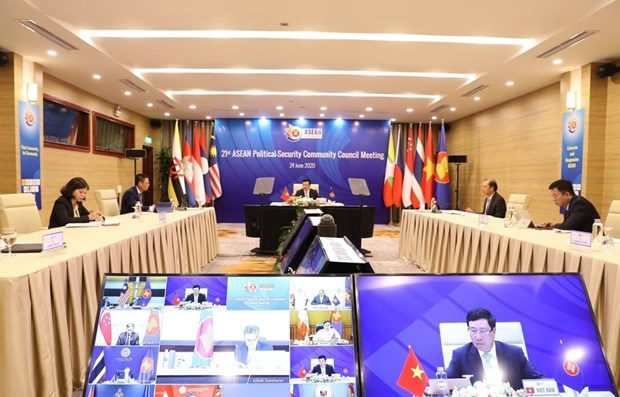Vietnam leaves deep imprint during 25 years of ASEAN membership
ABO/VNA - In the 25 years since Vietnam joined ASEAN, it has left a major imprint on the bloc thanks to its willingness, effort, responsibility, and contribution to overall achievements.
Vietnam has participated in and contributed actively to the region’s integration and community building. Lao Foreign Minister Saleumxay Kommasith said that in the political sphere, Vietnam becoming a member of the bloc on July 28, 1995 paved the way for other countries like Laos, Myanmar, and Cambodia to also join and for ASEAN to move from an association of countries with similar political systems to one for all countries in the region to cooperate, regardless of political differences.
Former ASEAN Secretary-General Ong Keng Yong stated that with its position and role, Vietnam has become a bridge linking the south and the north of Southeast Asia.
Geographically and demographically, the main contribution of Vietnam upon becoming an ASEAN member has been to combine all regions of Southeast Asia into a unified bloc, demonstrating that ASEAN has increased cooperation in the Asia-Pacific region and remained consistent to the principle of multilateral cooperation to bring about practical benefits to countries in the region.
 |
Over the past 25 years, Vietnam has actively worked with other countries to implement important cooperative agreements and plans, in particular the building of the ASEAN Community. The official formation of the ASEAN Community at the end of 2015 saw remarkable contributions from Vietnam, including initiatives and proposals such as the Hanoi Plan of Action 2010. Vietnam is also one of the leading countries in carrying out the ASEAN Community’s goals.
Vietnam’s imprint is also reflected through its contribution to the expansion of ASEAN cooperation. As the Chair in 2010, it launched an initiative to expand the membership of the East Asia Summit (EAS) by promoting the admission of Russia and the US. Vietnam also proposed an initiative to expand the ASEAN Defence Ministers’ Meeting mechanism (ADMM Plus).
These are very important mechanisms in links not only within ASEAN but also between ASEAN and other countries, thus helping improve the grouping’s position. Professor Carl Thayer from the University of New South Wales in Australia believes that Vietnam has used its diplomatic experience well in promoting ASEAN’s relations with world powers.
Through a series of initiatives and programmes such as “ASEAN Vision 2020 and Implementation Plan”, “Declaration of ASEAN Concord II”, “ASEAN Charter”, “2009-2015 Roadmap for an ASEAN Community”, “ASEAN Integration Initiative”, and “Master Plan on ASEAN Connectivity”, Vietnam is assessed to have proven its role in coordinating mechanisms with international partners by connecting, expanding, and deepening relations between ASEAN and these partners.
Notably, the roles and responsibilities of Vietnam are clearly demonstrated through its successful undertaking of the ASEAN Chairmanship, introducing specific contributions and initiatives. Just three years after joining ASEAN, as the Chairman of the bloc in 1998 it drafted the Hanoi Plan of Action to promote post-Asian financial crisis recovery, contributing to narrowing the development gap among member states.
In 2010, when assuming the Chair of ASEAN for a second time, it promoted the completion of practical activities after ASEAN approved declarations and action plans.
Experts also said that over the past 25 years, Vietnam has contributed greatly to the dynamism and economic attractiveness of ASEAN, as well as to ensuring regional peace and security.
Malaysian Professor Yeah Kim Leng said it has made contributions to maintaining the region’s average annual growth of 5 percent over the past several decades and played an important role in maintaining the attractiveness of ASEAN among foreign investors.
In terms of peace and security, Vietnam helped build the Declaration on the Conduct of Parties in the East Sea as well as sped up the building of a Code of Conduct in the East Sea, so as to ensure peace and stability in the waters. Former ASEAN Secretary-General Ong Keng Yong said that Vietnam has made positive and constructive proposals and maintained the principle of mutual respect and respect for peace and stability.
In 2020, as Vietnam undertakes the ASEAN Chairmanship for a third time, the country in particular and ASEAN in general face great challenges from COVID-19. However, Vietnam has played an important role in leading a collective response to the pandemic, said ASEAN Secretary-General Lim Jock Hoi. Under its Chair, ASEAN has held several online conferences to discuss ways to deal with the disease, in particular the Special ASEAN and ASEAN Plus Three Summits on COVID-19, and agreed on speeding up the implementation of a COVID-19 ASEAN Response Fund, a Regional Reserve for Medical Supplies, a Standard Operating Procedure (SOP) on Public Health Emergencies, and a Post-COVID-19 Recovery Plan.
Frederick Kliem, an analyst with the Centre for Multilateralism Studies at the Singaporean-based S. Rajaratnam School of International Studies (RSIS), affirmed that Vietnam is a respectable, trustworthy, and constructive member of ASEAN.
Meanwhile, Lim Jock Hoi stressed that the country’s economic achievements, political stability, leadership vision, and energy are “assets” for the building of the ASEAN Community./.
(Source: VNA)
 về đầu trang
về đầu trang







